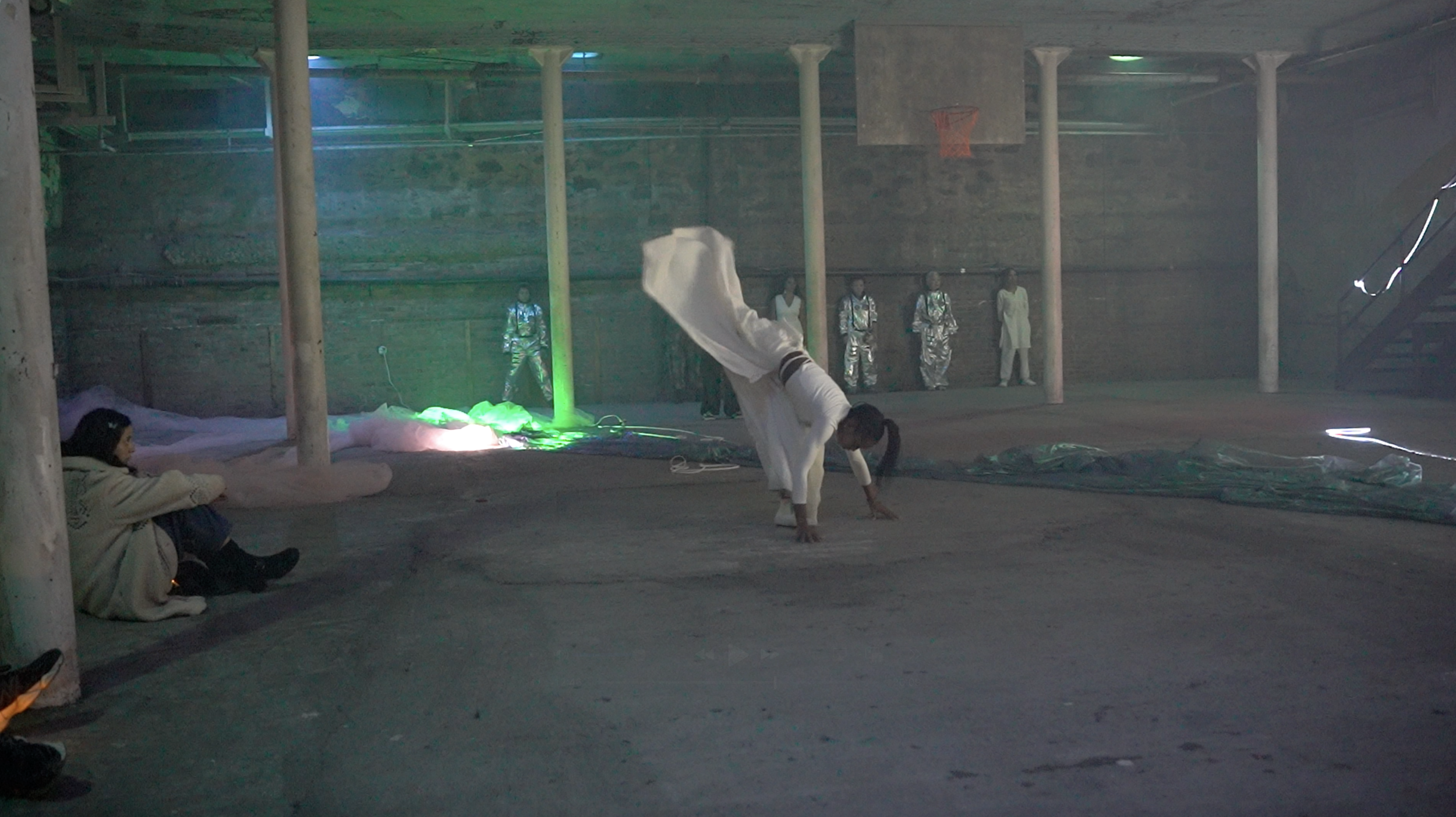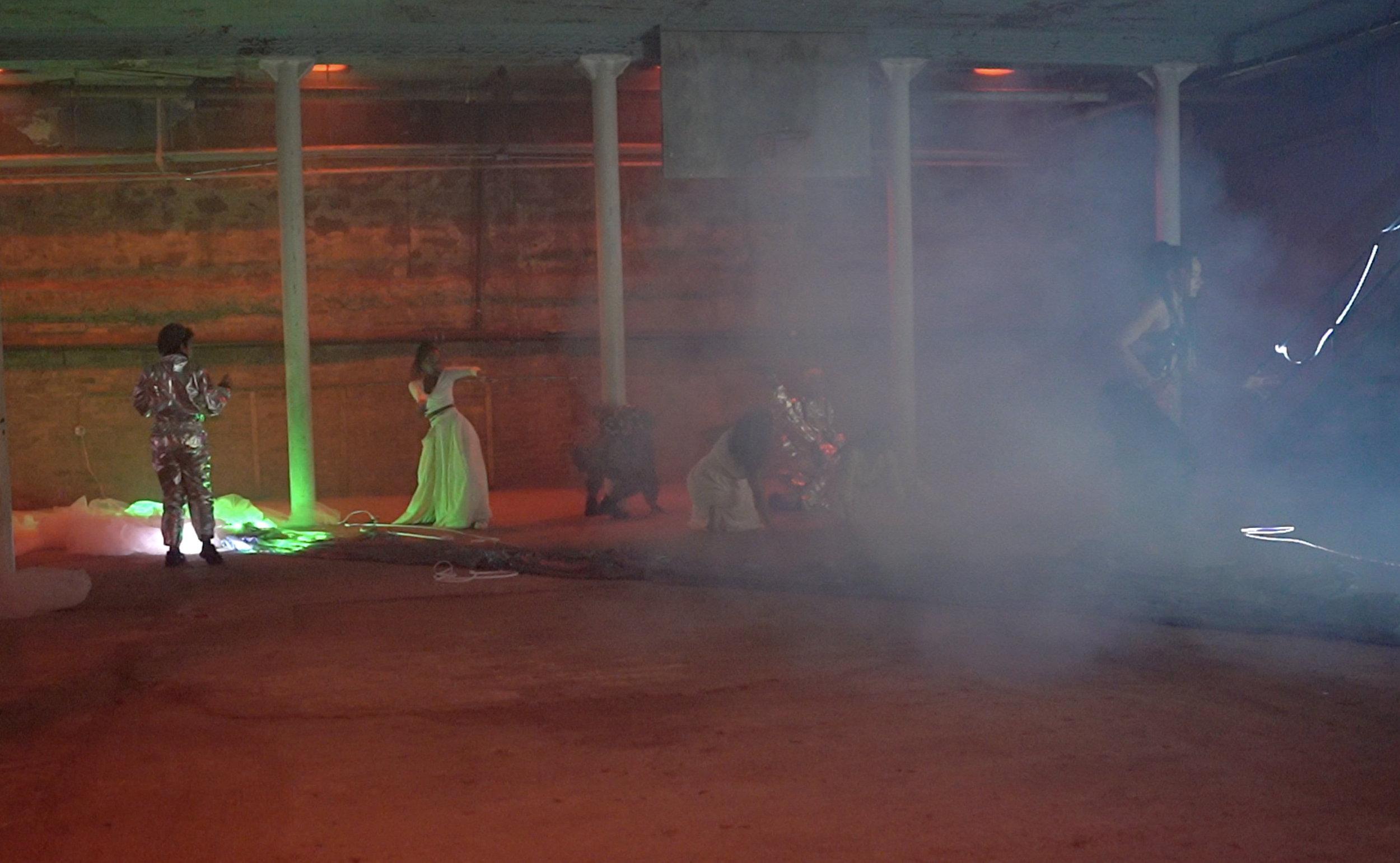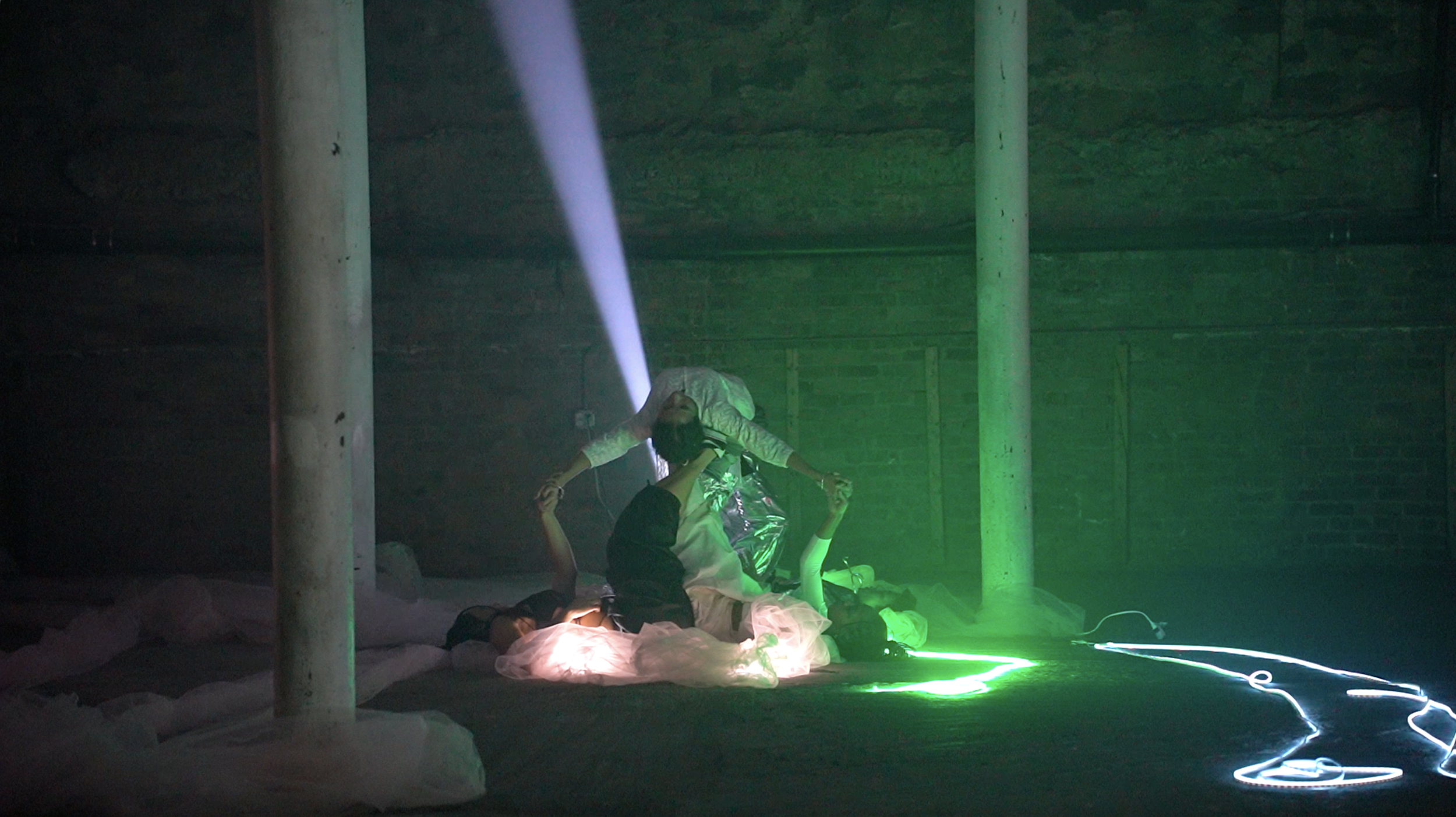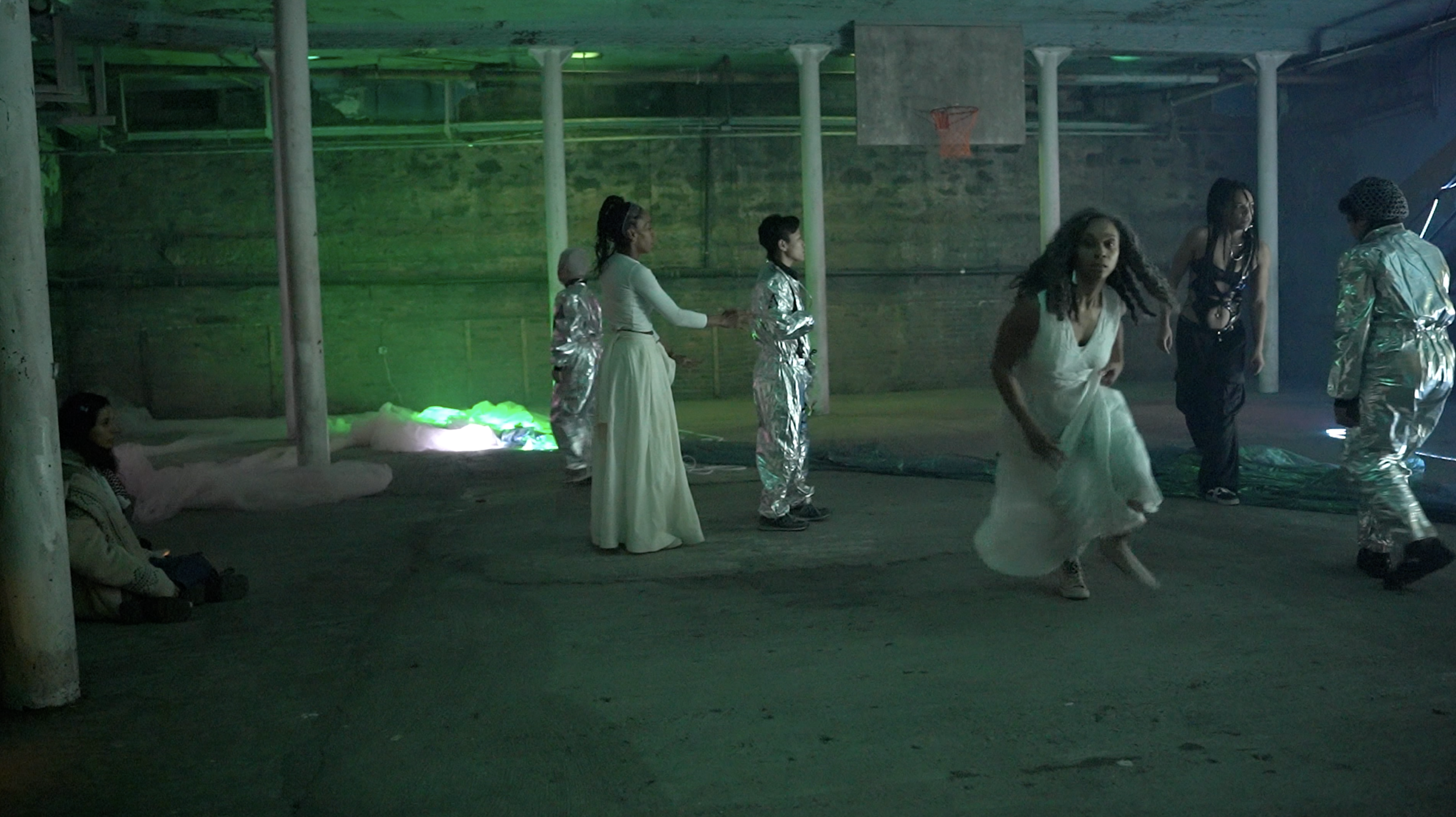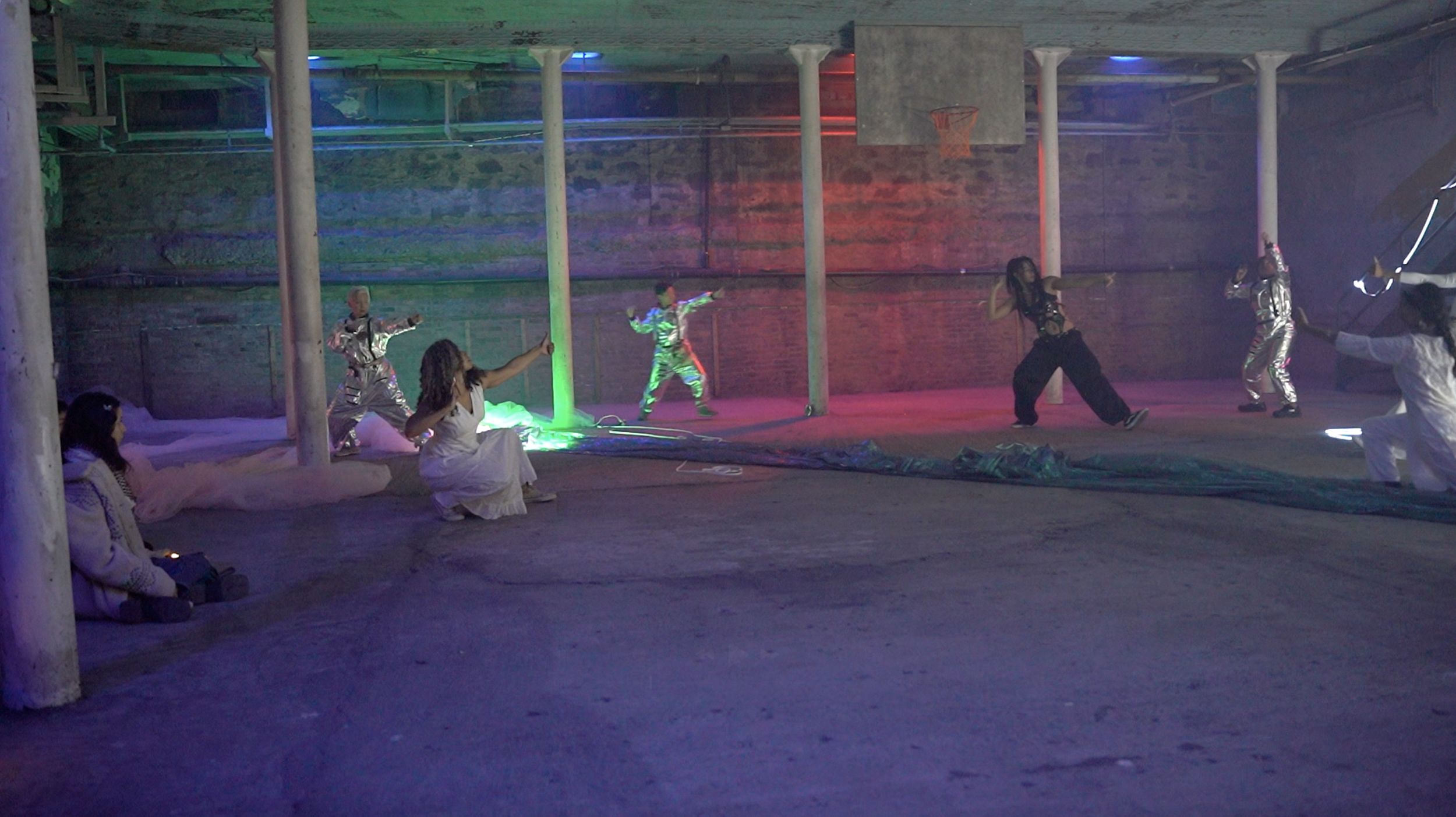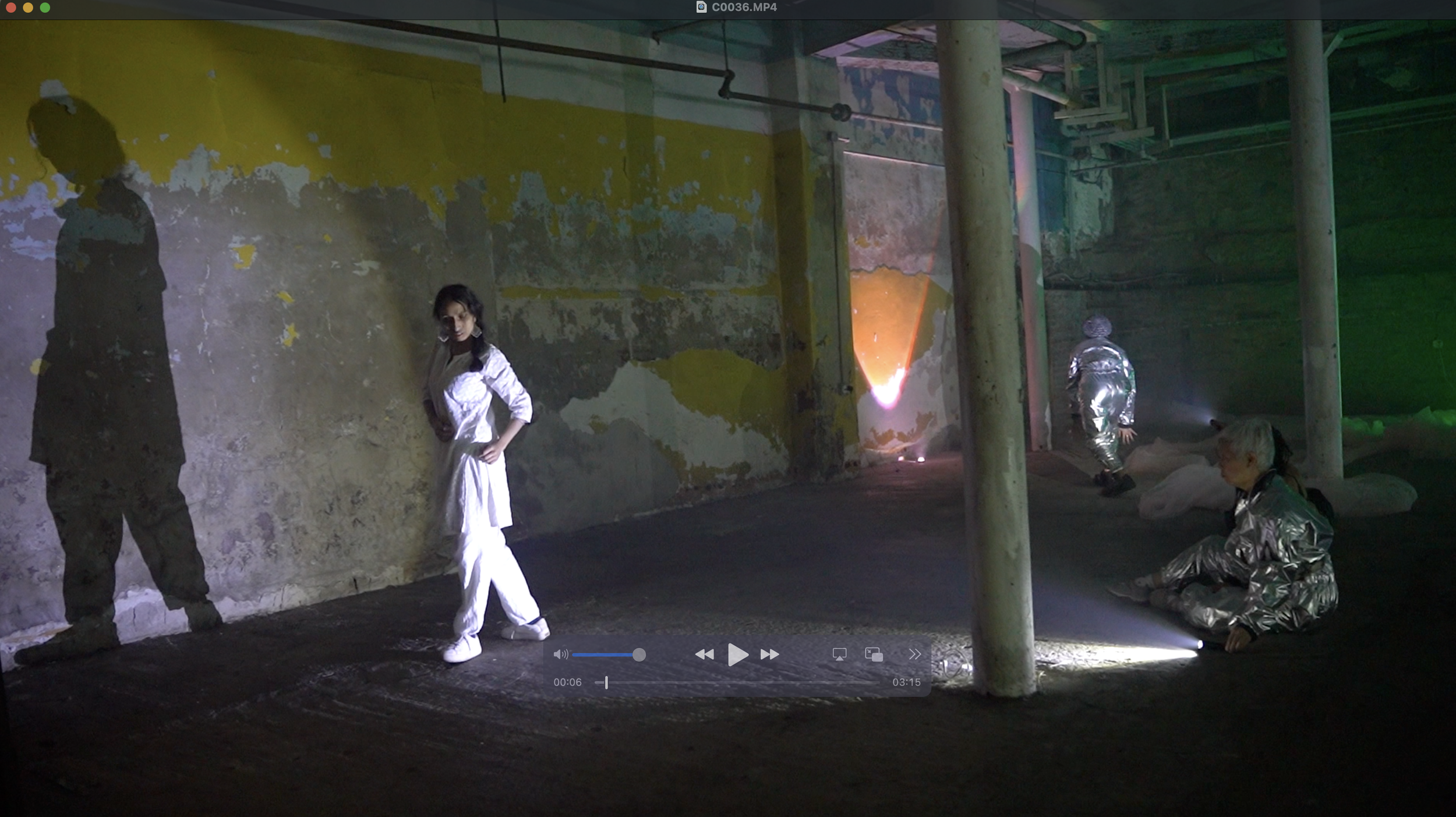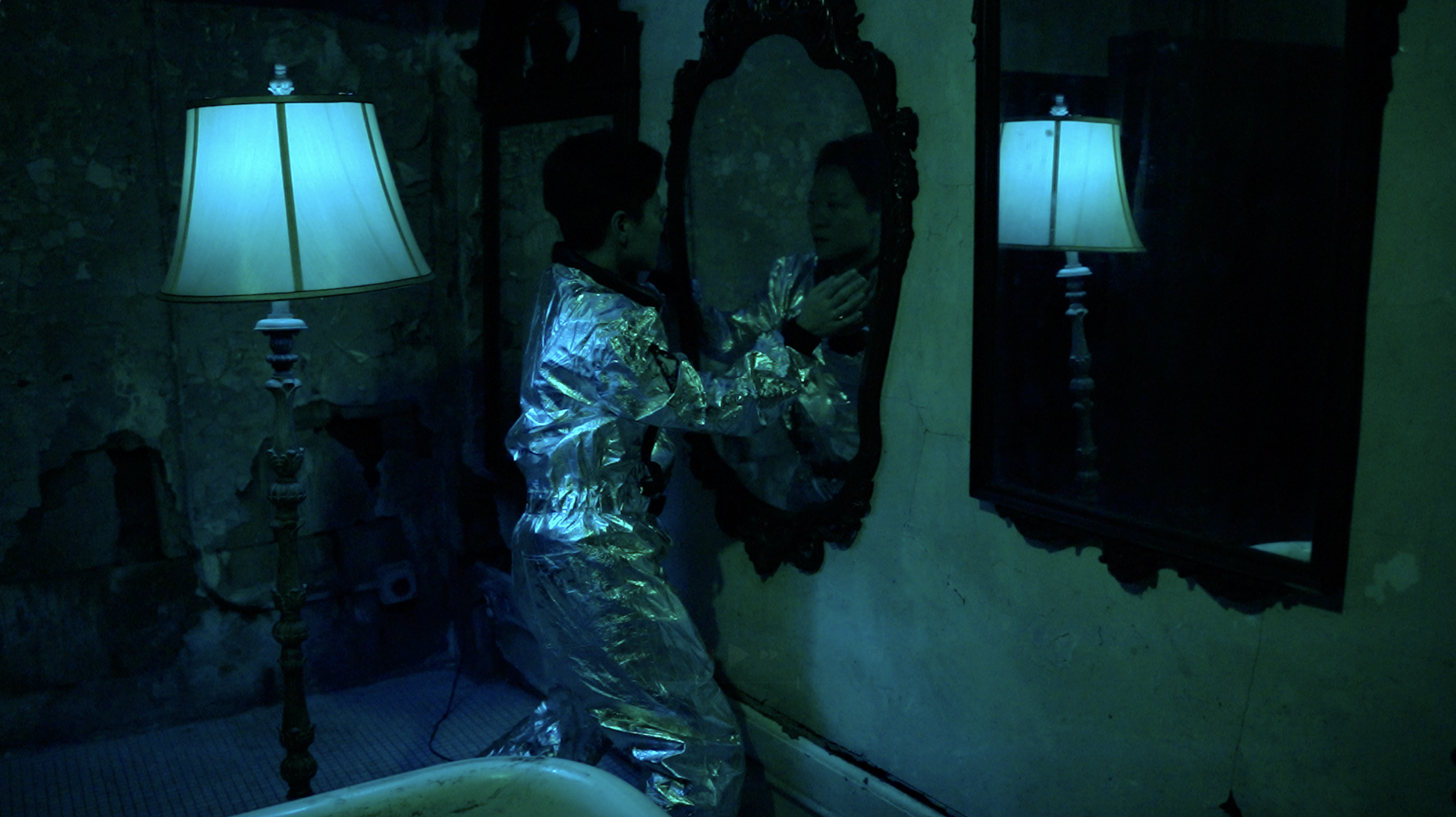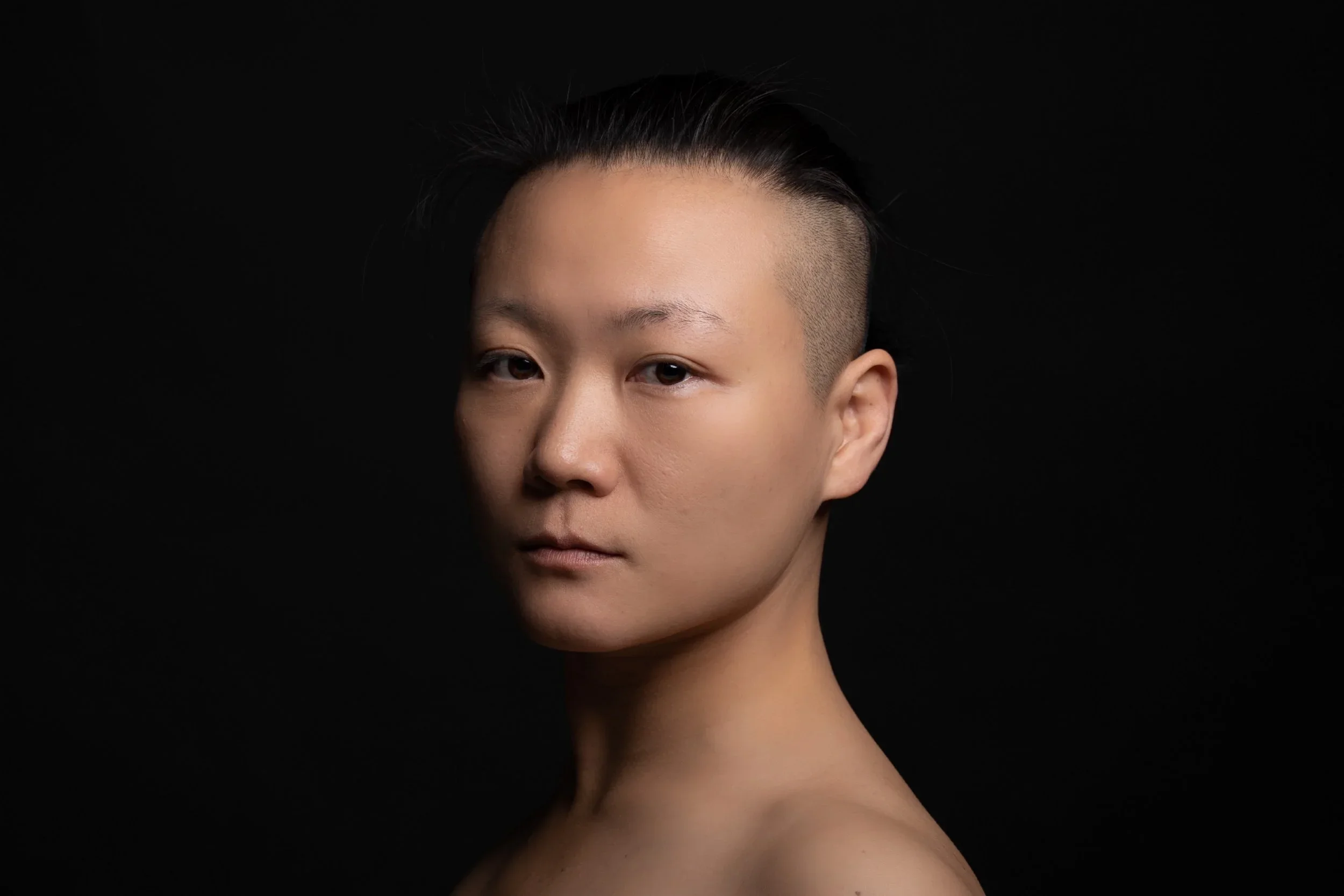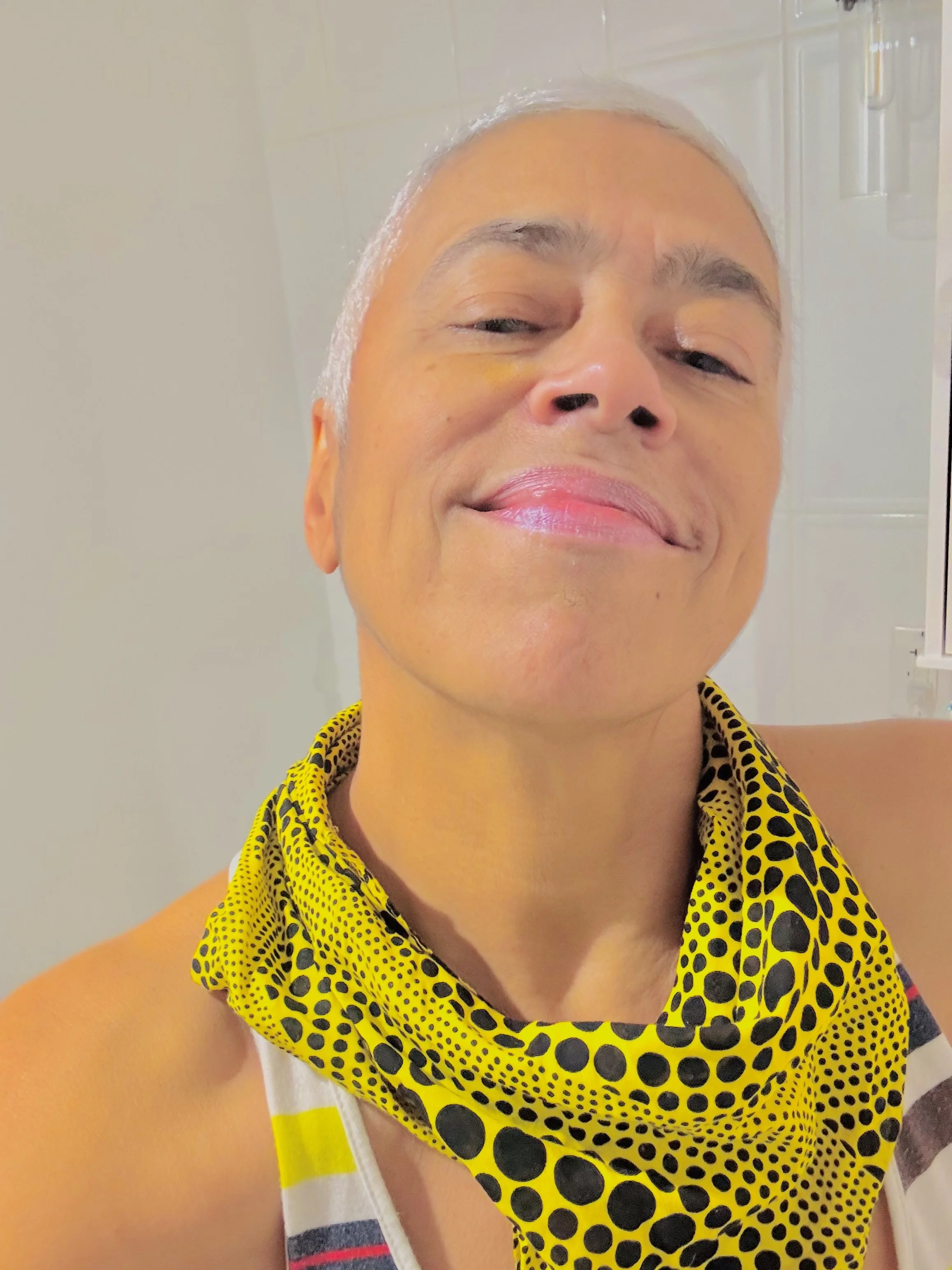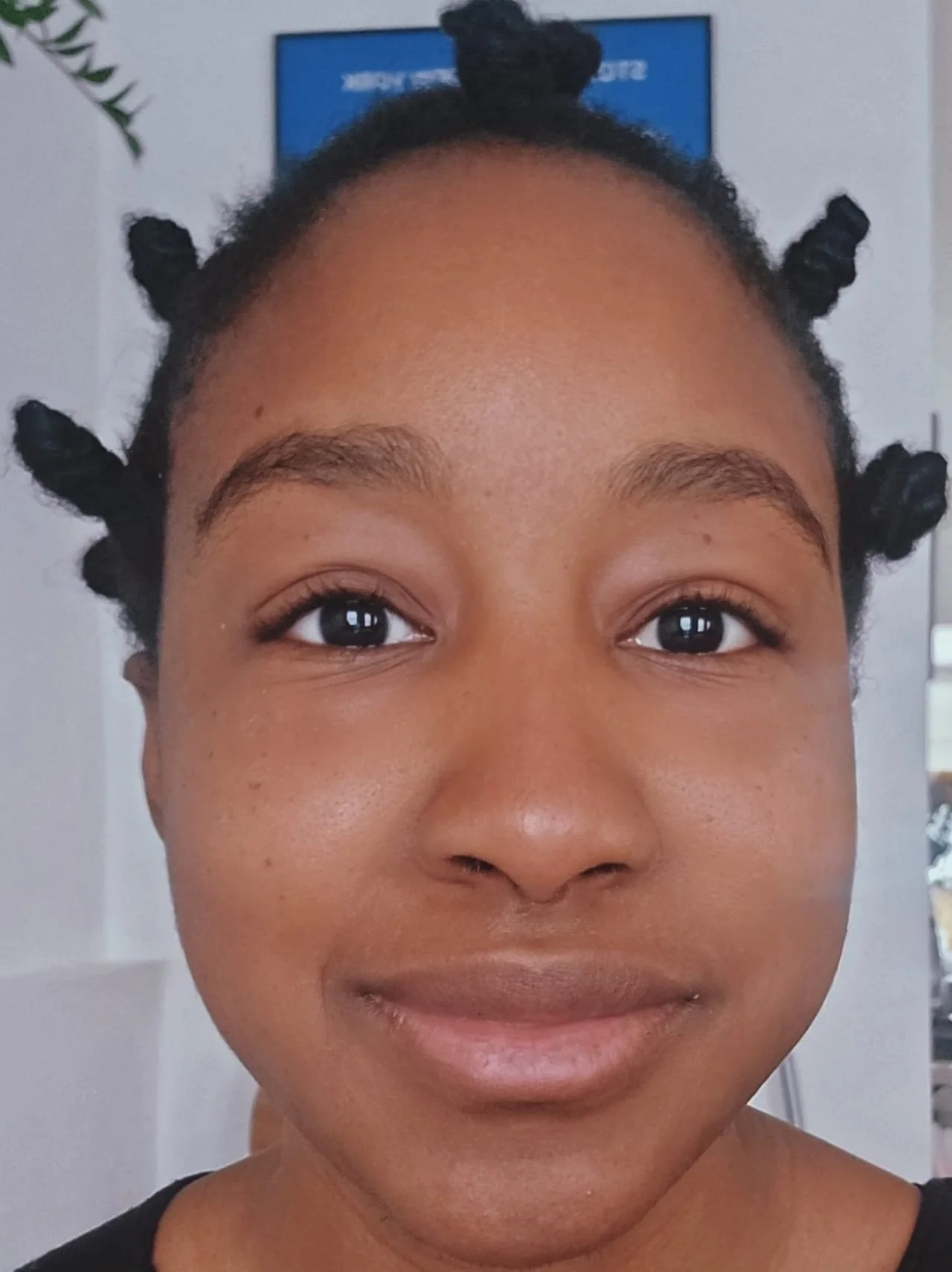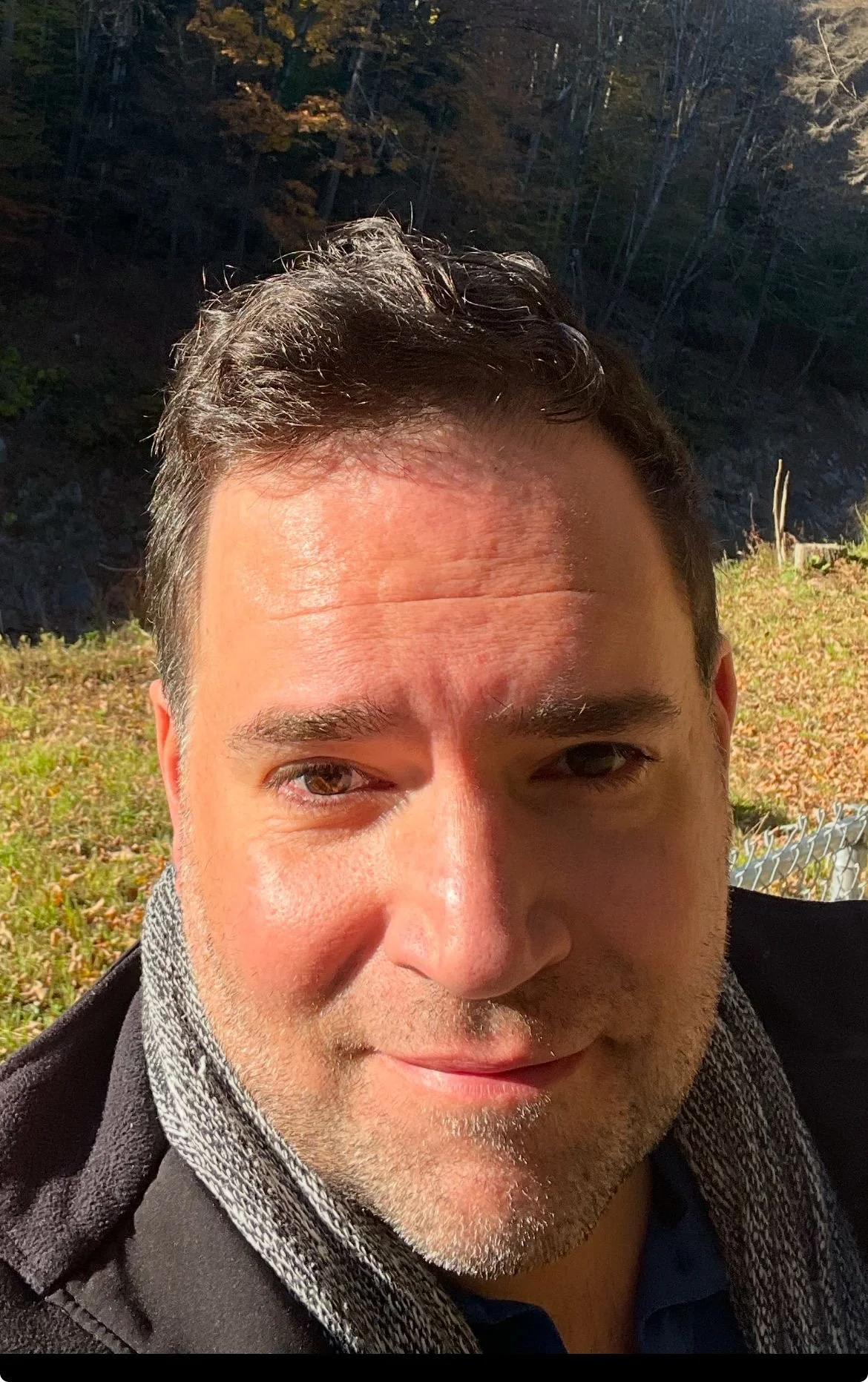
When They Have Their Own Historians
Loss, Reinvention, and Imagined Futures
When They Have Their Own Historians
Shadows, Archives & the Afterlife of MemoryA Performance by Accented ProjectsConceived and Directed by Fei Li
Co-Directed by Gayle Fekete
Composed by Jacqueline Coston
Performers / Co-Creators
Aika Takeshima, Djassi DaCosta Johnson, Jeevika Bhat, Katreen Toukhy, Mame Diarra Speis-Biaye, Shizu Homma, YAKIKAT
Production Support Team: Sasha Thliha, Athos Cakiades
📍 Gymnopedie, Brooklyn
🕯️ November 6, 2025
Concept Statement
“Until the lions have their own historians, tales of the hunt will always glorify the hunter.”— Chinua AchebeWhen They Have Their Own Historians is a multimedia performance and living archive that explores memory as a form of resistance.
It begins with a simple question: Who gets to record, to remember, to speak?
In a world where colonialism, patriarchy, and capitalism have disciplined the body into silence, this work gathers dancers, artists, and storytellers to reclaim memory as an embodied practice. Through myth, movement, and play, they reconstruct forgotten genealogies: where childhood games become ritual, and gestures become counter-archives.
This work reimagines history through the intelligence of the moving body.
Dancers bring their divines or ancestral figures, children’s games, and a conceptual thread, creating a living continuum where individual memory meets collective becoming.
The result is a social experiment, a rehearsal for new forms of relation.
Conceptual Threads
Gayle — Sky Woman & Turtle Walk
Mame Diarra — River Goddess Mame Coumba Bang
Jeevika — Shikhandi: The Rigged Game and the Will to Flip
Shizu — Joan of Arc and the Politics of Misreading
Djassi — Oya: Wind, Storm, and Mycelial Blackness
Aika — Ama-no-Uzume: Laughter as Light
Katreen — Hathor: The Body as Continuum
YAKIKAT — Anubis: Wandering as Empowerment
Fei — Smuggling Back Through Play: Nostalgia, Capital, and the Postcolonial Stage
About the Project
When They Have Their Own Historians is part of Fei Li’s ongoing research into embodied archives, diasporic memory, and the politics of play.
The project began with the question: Can the body become its own historian?
Drawing from Bakhtin’s idea of carnival, Angela Carter’s critique of pantomime, and Karthika Nair’s rewriting of the Mahabharata in Until the Lions, the work enacts a reversal:
Instead of history as spectacle, history becomes an encounter; instead of myth as a monument, myth becomes a movement.
Sections unfold as a dialogue between ritual and rebellion, tenderness and defiance.
The classroom becomes a site of unlearning; the playground, a stage of rediscovered collectivity.
The audience witnesses a living ecosystem of art: breathing, remembering, transforming.
“We are not orbiting in somebody’s brilliance;
we are in mutual awe of each other.”
Acknowledgments
This performance is supported by the New York State Council on the Arts (NYSCA) with fiscal sponsorship from NYFA.
Special thanks to Gymnopedie, Accented Projects, and the community of artists, friends, and witnesses who made this work possible.
All ticket proceeds directly support the participating artists.
Practical Info
📍 Gymnopedie, 1139 Bushwick Ave, Brooklyn
🕓 Doors open 6:40 PM | Performance begins 7:00 PM
Performers / Co-Creators
Directors
Production Support Team
Sasha Thliha
Aika Takeshima (she/her) is a contemporary dance artist, instructor and choreographer from Japan. She is the co-founder of sarAika movement collective, a multidisciplinary dance company.
Aika holds a 200-hour Yoga Teacher Certification, and her practice blends dynamic floorwork, anatomical awareness, and somatic approaches shaped by ballet, street dance, and yoga. Her choreography seeks clarity, intentionality, and freedom of expression while engaging deeply with themes of identity, equity, and inclusion. Through her work, she amplifies diverse and underrepresented voices, cultivating transformative artistic and community experiences.
Since 2021, Aika and sarAika have performed widely in the U.S. and abroad, with commissions from IATI Theater, Et Alia Theater, Kyoto University (Prof. Naoko Tosa), Stony Brook University (Assoc. Prof. Philip Baldwin), and The Museum of the City of New York, among others. She was also a resident artist at Dance Base Yokohama during YPAM2022 (Yokohama International Performing Arts Meeting). Her choreography has been presented at venues including Judson Church, Movement Research, Symphony Space, Dixon Place, Queens Theatre, Ruth Page Center for the Arts (Chicago), Detroit Film Theatre (DIA), and internationally in Sweden, Italy, and Japan. Beyond dance, she works as a certified DEI practitioner to build a more inclusive and livable society.
Djassi DaCosta Johnson is a dancer, choreographer, actor, photographer, filmmaker, writer, designer & doula. She has worked and apprenticed with MOMIX, Pilobolus, Dance Brazil, Earl Mosley, Bill T. Jones, Hernando Cortez, Ron Brown’s Evidence, Forces of Nature and Urban Bush Women among others. Djassi worked as a dancer & choreographer in Brazil, and then in Italy for 9 years in Television & Film. Her choreography has been displayed in fashion shows, music videos, and films, including for ESSENCE, NIKE, PNB Nation, Morellato & Pandora Jewelry & NYFW for Isamar Designs & Studio 189. Djassi performs in collaboration with visual artists & jazz musicians and has collaborated with Eddie Peak, Lia Chavez, Nate Lewis and Alice Walker. She has choreographed and performed in music videos including for Gloria Gaynor & Joan Baez. Djassi’s dance films have appeared in the Moving Body Moving Image & Cinema Verde’s International Environmental Film festivals. She started the Modern Dance program at Brooklyn Ballet in 2014 and is an Assistant Professor of Dance who started the dance concentration at The University of The Virgin Islands in St. Croix, USVI from 2020-2022. Djassi is a judge & Horton teacher for YAGP and the Joffrey Ballet School. Her recent acting credits include Not My Family: The Monique Smith Story on Lifetime and The Gilded Age, Season 3. Djassi holds a BA in Anthropology from Barnard and an MFA in Dance, New Media & Technology from NYU Tisch and was a 2023-24 Artist in Residence at Barnard’s Movement Lab. She lectures about the importance of the fungal world for human survival and teaches the movement modality she created, “Mycelium Movement” at universities, organizations and conferences with the goal of connecting people with ancient and ancestral earth wisdom towards our collective survival on an endangered planet.
YAKIKAT (formerly known as J Alex Ray) is a New York-based visual and performance artist and pole dancer. Their work consists of experimental movement and self-portraiture revolving around themes of personal evolution and growth. Their visual storytelling harmonizes improvised dance and endurance challenges interacting with material and live deconstruction. As YAKIKAT performances are revisited across new showcases, the ritual evolves from space to space, showing the impact of the live environment and the live energetic transmutation between the ever-shifting relationship between time, YAKIKAT, and the audience.
At age seventeen, YAKIKAT established her interest in self-portraiture and surrealist expression. In 2017, she entered the world of pole dance, exploring and overlapping other forms of contemporary dance into this new medium of expression. Her career as a performer blossomed in San Francisco, choreographing and competing in Pole Sport Organization (2019, 2020, and 2022), showcases by Flux Vertical Theatre, Twisted Windows, and other private events. They graduated with a bachelor’s degree in Communication Studies in 2019 from San Francisco State University, where they studied performance art and digital media. In 2022, they moved to NYC to continue their pole dancing career and pursue performance art.
Yakikat has presented work with galleries and collectives such as La Mama Gallery, Grace Exhibition Space, MOMENTA, //PIXELMOUTH, ChaShaMa, Intima, and private events. As they develop their performance work and build visual media portfolio, YAKIKAT continues to showcase their dance and movement work within the pole dance and nightlife community. They have also been featured in Don Toliver’s “No Pole” music video, directed by rubberband..
Jeevika Bhat (she/her) is a Manhattan based dancer and choreographer who explores the confluence of her cultures through a contemporary Indian medium. Her background is in Odissi, an East Indian classical dance form known for its nuanced storytelling and graceful fluidity. Academically, she is a graduate of UC San Diego, where she earned a BS in Mathematics with minors in Linguistics and Dance, and UC Irvine, where she earned an MFA in Dance.
Katreen Toukhy draws upon movement, land elements, and her intersectional reality to create multidisciplinary work. She is also a certified meditation instructor who practices bringing people together through somatic movement workshops that weave in political transformation. Toukhy uses these processes to shake off colonial narratives and assert presence, informed by her experiences as a Coptic Egyptian American-born woman. She resides in Lenapehoking/NYC and has exhibited and led workshops nationally and internationally.
Mame Diarra Speis-Biaye (she/her) is a mother and movement improviser whose work is rooted in play, risk, duration, rigor, and experimentation. Formerly a performer and Co-Artistic Director of the critically acclaimed Urban Bush Women, she continues to shape the field of dance through performance, pedagogy, and collaboration.
Her most recent work, Haint Blu, is a site-responsive piece co-created with Chanon Judson. Named after the color used on Southern porch ceilings to ward off spirits, Haint Blu is steeped in memory, magic, and the movement into stillness and rest. It offers an embodied exploration of familial lines, healing, and the ancestral technologies, stories, and gestures passed down through generations.
Mame Diarra has worked with a wide range of visionary artists, including Gesel Mason, The Dance Exchange, makini jumatatu poe, Deborah Hay (as part of Sweet Day curated by Ralph Lemon at MoMA), Ligia Lewis, Baba Israel, Marjani Forté-Saunders, and Liz Lerman. In 2021, she performed as a guest artist with MBDance in The Motherboard Suite alongside Saul Williams, under the direction of Bill T. Jones. She is a recipient of the Alvin Ailey New Directions Choreography Lab and a Bessie Award for Outstanding Performer.
Her performances and choreography have been featured at venues including the Kennedy Center, Long Island University, Joyce SoHo, Hollins University, BAAD!, Danspace Project, BAM, Dixon Place, BRIC, Dance Place, the Historic Hampton House, MASS MoCA, and The Kelly Strayhorn Theater.
Speis-Biaye has developed a unique movement and teaching methodology called the Liberated Pelvis, which explores pelvic mobility as a source of powerful locomotion and a portal to the personal, cultural, and ancestral stories held within the body. She has shared this practice across the U.S., South America, Senegal, and Europe, and has held teaching appointments at Princeton University and Montclair State University.
She maintains a strong relationship with her alma mater, Virginia Commonwealth University (VCU), having returned in various capacities, including as the commencement speaker for the VCUArts Class of 2020–2021. In recent years, she has co-choreographed multiple works with Urban Bush Women and collaborated on Cannabis: A Viper Vaudeville, created by Baba Israel and Grace Galu and directed by Talvin Wilks.
Her latest projects include being a commissioned artist for the Toni Morrison Project at the McCarter Theatre at Princeton University and a performer and collaborator in Leslie Parker’s A Call To Remember, both of which premiered in 2023.
Shizu Homma is a Brooklyn born, Brooklyn based artist. Though she trained as a visual artist, most of her activities have been in dance.
Her degrees are an A.A.S. in Illustration from FIIT, and a B.A. and M.F.A. in art. She is also certified to teach yoga and somatic movement.
Shizu started dancing for experimental and butoh choreographers, such as Anne Bassen, Nancy Zendora, and Emma Hogarth in the 1990’s. She has also danced for modern dance choreographers such as Afua Hall, Arthur Aviles, and Stanley Love. She has also danced with visionary artists such as Celeste Hastings and Catherine Hourihan, who blends butoh with nightlife performance.
Gaining inspiration from genre defying artists, Shizu has made butoh influenced dances of her own, where she blends choreography with structured improvisation, creating work that delves into the absurdity of human behavior, and repercussions of violence. She also deals with themes such as feminism and exploitation.
Shizu has also made collages, poems, performance art, and at this time continuing to study about the nervous system, connective tissue system, and studying dance.
Some of her dance activities include teaching and choreographing for Dance Company Middlebury, teaching at Trinity/LaMama, KYLD’s summer workshop, and at F.A.M.U. Her work has been supported by Dancing in the Streets, BAAD, Chashama, and No Longer Empty. Some of the dance programs her work has been seen are: Movement Research, AUNTS, BAAD, Joyce Soho, HOWL Festival, Le Petit Versailles, and the Bronx Museum.
MotherDaughter (Jacqueline Coston) is a violinist and composer based in Brooklyn, NY. A proud descendant of Bedford-Stuyvesant natives and raised in Hempstead, Long Island, she began studying piano and violin in childhood and has remained deeply connected to music ever since.
MotherDaughter has performed with the Harlem Symphony Orchestra, Litha Symphony Orchestra, Protestra, and the New Conductors Orchestra, appearing at renowned venues including Carnegie Hall and the Apollo Theater. Currently, Jacqueline works as a freelance performer and composer, exploring the intersection of sound, healing, and storytelling. Her practice includes intuitive improvisation, sound frequency healing, and film scoring—an evolving journey through which she continues to expand the role of music in community and personal transformation.
As a conduit for space for reflection and healing. MotherDaughter invites you to receive each sound offering as a restorative force that speaks to the soul and moves the spirit.
Gayle Fekete is currently a Professor of Practice at The New School NYC. She also served as Associate Dean and Interim Dean at the School of Drama. Gayle recently co- facilitated The Dream Machine project at Lincoln Center NYC with Nona Hendryx 2024 and CAMPING! an interdisciplinary dance exchange with Parsons Paris in summer of 2023. She is the instigator of feketePROJECTS, a collective performance platform working with numerous local experimenters and risk takers. feketePROJECTS is invested in movement centered performance practice and installation including work in Poland and Croatia. She is currently attached to special projects with the Provost office at The New School NYC. Gayle is based in NYC and also associated and connected to the Los Angeles community. She has been in partnership with Urban Bush Women NYC as guest artist and consultant on numerous residencies, Choreographic Centre Initiative, and creative convenings. Fekete has presented and produced several works and immersive performance projects and facilitated numerous CSU Summer Arts Dance intensives with recognized inter-disciplinary artists in the field. She is a creative consultant/dramaturg for independent performance practices. Gayle is also an independent freelance movement-maker who performs with FEK-MAC, Mechanism Dance Theatre, Fools Fury Theatre, Outside In Theatre and The Market Gallery Los Angeles.
Fei Li is an interdisciplinary artist born in Minnan, China, and based in Lenapehoking (Brooklyn). Her practice weaves together painting, installation, performance, community ritual, and participatory experience to reimagine the architectures of cultural memory. Working across mediums and scales, Li constructs sensuous, emotionally charged environments that foreground the body as a site of knowledge, longing, and transformation. Her work offers a space for reflection on the entangled forces of personal history, diasporic inheritance, and global displacement—mapping how memory migrates, mutates, and survives across borders both visible and invisible.
Athos Cakiades
Performance Essay
Smuggling Back Through Play: Nostalgia, Capital, and the Postcolonial Stage
Bakhtin described carnival as the temporary suspension of hierarchies, the world turned upside down, where laughter and the grotesque body undo official seriousness. In Pantoland, Carter tracks how this carnival energy is both preserved and neutered in British pantomime: the cross-dressed dame, the principal boy, the obscene animal sidekick, all still present but domesticated for family audiences.
Children’s games, however, preserve something of carnival’s core. They too are excessive, repetitive, rule-bound yet always on the verge of breaking rules. They invite inversion: the smallest child might become “it,” the seeker, the powerful one. They enact temporary worlds in which identities shift and collapse. By channeling these energies through nostalgia, this project reimagines the act of smuggling back through the gestures of childhood play. Nostalgia is a tactic, a mask, a cover story under which festivity and disorder return to the stage.
The Politics of Innocence
In performance studies, play is often regarded as a training ground for social roles. Yet children’s play also carries a memory of other possibilities, of living alongside animals, of speaking to invisible companions, of blurring self and other. Carter reminds us that in the early mythic strata of culture, humans did not regard themselves as separate from animals; stories of geese, cats, and cows were part of everyday ontology. Children’s games rehearse this porousness. To re-stage them as art is to recall a time when the boundaries of species, gender, and hierarchy were less fixed.
By replacing desire with nostalgia, the project emphasizes how longing doesn’t always orient toward the erotic past but often toward a reimagined future. Nostalgia is movement: a smuggling route back into the present, carrying fragments of ritual hidden inside the pockets of memory.
The Limits of Carnival
Umberto Eco reminds us that “a carnival that lasts forever is no longer a carnival but becomes the normal condition of society.” Carnival, in his view, must be brief, an interlude that refreshes the order it temporarily suspends. The perpetual carnival, whether Disney’s “Magic Kingdom” or a television landscape of continuous variety, loses its potency. It becomes simulation: a hyperreality that promises transgression while delivering only repetition.
Eco’s insight clarifies Carter’s lament. Pantoland has never been destroyed but absorbed into the permanent economy of entertainment, its rituals commodified as family tradition. What once suspended hierarchies now rehearses them. The Dame, the Principal Boy, the animal sidekick persist as stock figures, their dangerous ambiguity reduced to nostalgic kitsch. Carnival has become branding.
In this context, nostalgia itself risks becoming another simulation; another Disneyfied return to innocence. The task, then, is to weaponize nostalgia, to use its guise of innocence as a means of stealth. If desire was too easily commodified, nostalgia can serve as a smuggler’s cloak, slipping unruly energies past the border guards of capital.
Capitalism, Excess, and the Smuggling Route
Capitalism thrives on appropriation: the obscene becomes product, the erotic becomes advertisement, the grotesque becomes theme park. In this system, nothing is more dangerous than what cannot be bought or sold. Carnival’s obscene laughter, its bodily fluids, its grotesque inversions, are dangerous not because they reject order but because they threaten to overflow it.
Eco reminds us that capitalism domesticates carnival by making it continuous, transgression packaged as routine. Carter’s imagery of flat scenery, false castles, and “real horses diminished into insignificance” captures this perfectly: reality survives only as mistake, only as waste, only as the horse’s sudden dung on stage.
bell hooks echoes this in her critique of cultural commodification: even resistance, once absorbed into the circuits of capital, is stripped of force. Today, playground games are franchised as toys, apps, and merchandise. Nostalgia itself risks becoming a consumer product.
This project resists that absorption. By staging games as live, collective acts, it reclaims their uncommodified residue: laughter, stumble, accident: the waste capital cannot sell. Nostalgia becomes a tactic against simulation, insisting on rupture rather than endless spectacle.
The smuggling project works by shifting attention to children’s play, which carries within it an echo of unruly ritual. Hopscotch grids become miniature architectures of inversion; counting rhymes smuggle in the cadences of ancient chants. The nostalgia of childhood memories operates as camouflage, allowing these fragments to cross into the present under the guise of innocence.
Postcolonial Echoes: The Disguised Archive of Play
Carter’s pantomime is not innocent of empire. The scenery parades Britain’s naval heroes, Drake, Raleigh, Cook, Nelson, reinscribing imperial discovery as festive entertainment. The smuggling back of carnival through play must therefore also reckon with postcolonial conditions: how memory and festivity survive in the wake of displacement, migration, and enforced forgetting.
Patricia Hill Collins reminds us that no site of culture is innocent; all are marked by what she calls the matrix of domination.Children’s games are themselves colonial artifacts: clapping rhymes trace routes across oceans, string figures recall Polynesian navigation, hide-and-seek echoes diasporic concealment.
Collins also teaches that marginalized communities produce standpoint knowledge: insights born from the intersections of oppression. When children transform colonial syllables into parody, when their games distort the colonizer’s tongue. They are smuggling knowledge through repetition, carrying survival across generations in rhythms that appear trivial but are anything but. Nostalgia for these games is therefore recognition of their double work: how domination saturates them, and how resistance flickers within them.
Nostalgia, in this context, is personal and geopolitical: a longing for what was suppressed by empire, disguised as innocent play.Smuggling back through nostalgia is thus a postcolonial tactic: it carries fragments of suppressed ritual across the border of the present, hidden in the folds of memory. The child’s game becomes a counter-archive, remembering what empire tried to erase.
